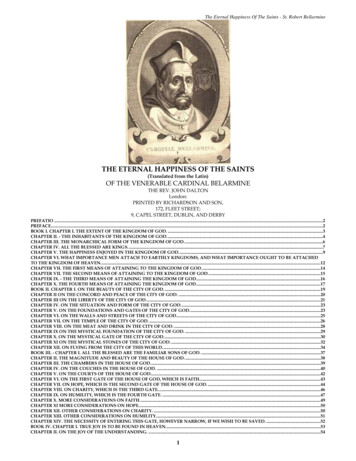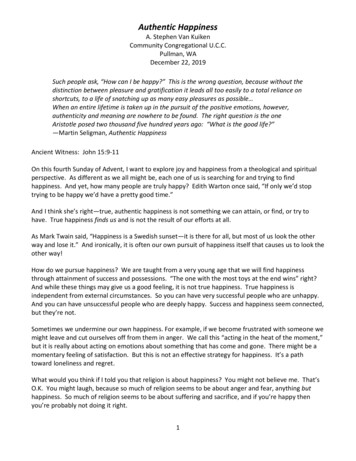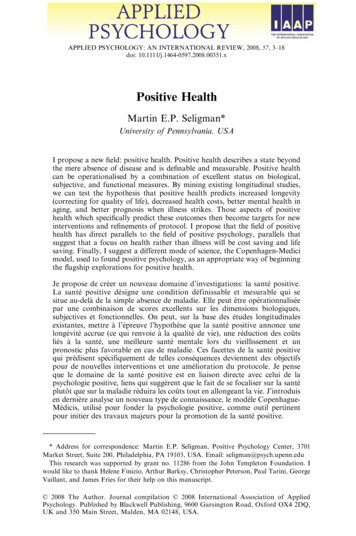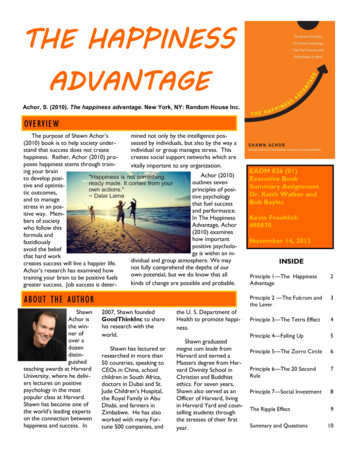
Transcription
The Eternal Happiness Of The Saints - St. Robert BellarmineTHE ETERNAL HAPPINESS OF THE SAINTS(Translated from the Latin)OF THE VENERABLE CARDINAL BELARMINETHE REV. JOHN DALTONLondon:PRINTED BY RICHARDSON AND SON,172, FLEET STREET;9, CAPEL STREET, DUBLIN, AND DERBYPREFATIO .2PREFACE.2BOOK I. CHAPTER I. THE EXTENT OF THE KINGDOM OF GOD. .3CHAPTER II. - THE INHABITANTS OF THE KINGDOM OF GOD. .4CHAPTER III. THE MONARCHICAL FORM OF THE KINGDOM OF GOD. .6CHAPTER IV. ALL THE BLESSED ARE KINGS. .7CHAPTER V. THE HAPPINESS ENJOYED IN THE KINGDOM OF GOD. .9CHAPTER VI. WHAT IMPORTANCE MEN ATTACH TO EARTHLY KINGDOMS, AND WHAT IMPORTANCE OUGHT TO BE ATTACHEDTO THE KINGDOM OF HEAVEN.12CHAPTER VII. THE FIRST MEANS OF ATTAINING TO THE KINGDOM OF GOD.14CHAPTER VII. THE SECOND MEANS OF ATTAINING TO THE KINGDOM OF GOD.15CHAPTER IX. - THE THIRD MEANS OF ATTAINING THE KINGDOM OF GOD.16CHAPTER X. THE FOURTH MEANS OF ATTAINING THE KINGDOM OF GOD.17BOOK II. CHAPTER I. ON THE BEAUTY OF THE CITY OF GOD. .19CHAPTER II ON THE CONCORD AND PEACE OF THE CITY OF GOD. .20CHAPTER III ON THE LIBERTY OF THE CITY OF GOD.21CHAPTER IV. ON THE SITUATION AND FORM OF THE CITY OF GOD. .23CHAPTER V. ON THE FOUNDATIONS AND GATES OF THE CITY OF GOD.23CHAPTER VI. ON THE WALLS AND STREETS OF THE CITY OF GOD.25CHAPTER VII. ON THE TEMPLE OF THE CITY OF GOD. .26CHAPTER VIII. ON THE MEAT AND DRINK IN THE CITY OF GOD. .28CHAPTER IX ON THE MYSTICAL FOUNDATION OF THE CITY OF GOD. .29CHAPTER X. ON THE MYSTICAL GATE OF THE CITY OF GOD.30CHAPTER XI ON THE MYSTICAL STONES OF THE CITY OF GOD. .32CHAPTER XII. ON FLYING FROM THE CITY OF THIS WORLD. .34BOOK III. - CHAPTER I. ALL THE BLESSED ARE THE FAMILIAR SONS OF GOD. .37CHAPTER II. THE MAGNITUDE AND BEAUTY OF THE HOUSE OF GOD.38CHAPTER III. THE CHAMBERS IN THE HOUSE OF GOD.39CHAPTER IV. ON THE COUCHES IN THE HOUSE OF GOD. .40CHAPTER V. ON THE COURTS OF THE HOUSE OF GOD.42CHAPTER VI. ON THE FIRST GATE OF THE HOUSE OF GOD, WHICH IS FAITH.43CHAPTER VII. ON HOPE, WHICH IS THE SECOND GATE OF THE HOUSE OF GOD. .44CHAPTER VIII. ON CHARITY, WHICH IS THE THIRD GATE.46CHAPTER IX. ON HUMILITY, WHICH IS THE FOURTH GATE. .47CHAPTER X. MORE CONSIDERATIONS ON FAITH. .49CHAPTER XI MORE CONSIDERATIONS ON HOPE.50CHAPTER XII. OTHER CONSIDERATIONS ON CHARITY. .50CHAPTER XIII. OTHER CONSIDERATIONS ON HUMILITY.51CHAPTER XIV. THE NECESSITY OF ENTERING THIS GATE, HOWEVER NARROW, IF WE WISH TO BE SAVED. .52BOOK IV. CHAPTER I. TRUE JOY IS TO BE FOUND IN HEAVEN.53CHAPTER II. ON THE JOY OF THE UNDERSTANDING. .541
The Eternal Happiness Of The Saints - St. Robert BellarmineCHAPTER III. ON THE JOY OF THE WILL,.56CHAPTER IV. ON THE JOY OF THE MEMORY.57CHAPTER V. ON THE JOY OF THE EYES.58CHAPTER VI. ON THE JOY OF THE EARS. .59CHAPTER VII. ON THE JOY OF THE NOSTRILS. .60CHAPTER VIII. ON THE JOY THE SENSES OF TOUCH AND TASTE WILL HAVE. .61CHAPTER IX. THE JOYS OF HEAVEN COMPARED WITH THOSE OF EARTH.62CHAPTER X. THE EARTHLY AND HEAVENLY PARADISE COMPARED. .63CHAPTER XI. THE GOODS OF THIS WORLD, AND THOSE OF THE EARTHLY PARADISE COMPARED WITH THE JOYS OF THEHEAVENLY PARADISE.64CHAPTER XII. ON THE PRICE THAT PARADISE WAS PURCHASED AT, COMPARED WITH PARADISE ITSELF.65BOOK V. CHAPTER I. ON THE TREASURE HIDDEN IN A FIELD.66CHAPTER II. ON THE PRECIOUS PEARL. .68CHAPTER III THE LABOURERS IN THE VINEYARD. .70CHAPTER IV. ON THE TALENTS.73CHAPTER V. THE PARABLE OF THE SUPPER. .77CHAPTER VI. THE PARABLE OF THE WISE AND FOOLISH VIRGINS.80CHAPTER VII. ON THE PRIZE. .83CHAPTER VIII. ON THE CROWN. .86PREFATIOANNO superiore, ad meam præcipue spiritualem utilitatem, conscripsi mihi ipsum, libellum, De AscensioneMentis in Deum, per Scalas Rerum Creatarum."* Nunc, quoniam placet Deo senilem ætatem meam adhuclongius aliquantulum protrahere, subit animum de coelesti Patria, ad quam anhelamus omnes filii Adam, quihanc vallem mortalitatis gementes et flentes incolimus, aliquid meditari, et meditationes stilo alligare, nepereant. Igitur in Scripturis Sanctis, quæ sunt veluti Epistolæ Consolatorise de Patria Cœlesti ad exiliumnostrum à Patre transmissse, quatuor nomina reperio, ex quibus utcunque bona illius Loci nobis innotescerepossunt. Nomina sunt, Paradisus, Domus, Civitas, Regnum, &c. [Already translated]PREFACELAST year, for my own spiritual benefit especially, I composed a "Gradual to ascend unto God fromthe Contemplation of created objects." Now, since it hath pleased God to prolong my old age a littlelonger, I wish to meditate on that heavenly country to which all the sons of Adam ardently aspire,who dwell, lamenting and weeping, in this valley of death; and these meditations I desire to write,lest they perish. Wherefore in the Holy Scriptures, which may be compared to "Consoling Letters"sent unto us in this our exile from heaven by our Father, I find four names mentioned, from whichwe may in a manner learn what are the good things of that land. The names are, -Paradise, Mansion,City, and a Kingdom. Of Paradise St. Paul speaks: “I know a man in Christ above fourteen years agosuch an one rapt even to the third heaven that he was caught up into paradise," &c. Of the"Mansion" the Son of God himself speaks: " In my Fathers house there are many mansions." Of the"City" St. Paul speaks in his Epistle to the Hebrews: "But you are come to Mount Sion and the city ofthe living God, the heavenly Jerusalem." Of the “Kingdom" there is mention made in St. Matthew:"Blessed are the poor in spirit, for theirs is the kingdom of heaven."This name is continually occurring in the Holy Scripture. The abode of the saints in heaven is called a"Paradise," because it is a most beautiful place, abounding in delights. But because men mightsuppose that paradise was a garden placed near a house, which could contain but few people, theHoly Spirit has added the name, " House," because it is a royal mansion, a great palace, wherein,besides a garden, there are halls, couches, and many other excellent things. But because a house,however large, cannot contain many people, and lest we should think that very few will possesseternal life, the Scripture adds the word "City," which contains many gardens and many palaces. Butsince St. John, speaking of the number of the blessed, saith: "After this I saw a great multitude whichno man could number." And as, moreover, no city can contain an innumerable multitude, the word"Kingdom" is used, to which is added, "the kingdom of heaven” than which no place in the wholeuniverse is more boundless and extensive.But, again, since in a most extensive kingdom there are many who never see each other, nor knowtheir names, nor whether they ever existed; and since it is certain that all the blessed behold each2
The Eternal Happiness Of The Saints - St. Robert Bellarmineother, and know each other, and converse familiarly with one another as friends and relations:therefore the Scriptures, not content with the name of "Kingdom," added that of a " City," that wemight know its inhabitants are truly citizens of the saints, and as familiar, and as closely unitedtogether, as the inhabitants of the very smallest city. But, in order that we might likewise remember,that these happy men are not only citizens of the saints, but also friends of God, therefore the HolySpirit calls that a “House," which it also named a " City."In fine, because all the blessed in heaven abound in delights, it is likewise called “Paradise." Hencethese four words Kingdom, House, City, Paradise mean one and the same thing; and the Paradise isso extensive, that it can truly be called a House, City, and Kingdom. Wherefore, concerning this mostblessed place I will first, under the word “Kingdom”; then under that of a "City ;" afterwards underthat of a "House ;" and, lastly, under the word "Paradise" meditate in the chamber of my heart; and,with God s assistance, commit to writing what He shall please to suggest unto me.BELLARMINEBOOK I. CHAPTER I. THE EXTENT OF THE KINGDOM OF GOD.WE may learn how important is knowledge of the kingdom of heaven from this circumstance, thatChrist our heavenly Master began His preaching with these words: “Do penance, for the kingdom ofheaven is at hand.” He also delivered nearly all His parables concerning the kingdom of heaven,saying, " The kingdom of heaven is likened & c. And after His resurrection, during the forty daysbefore His ascension, appearing to His disciples, He spoke to them of the kingdom of God, as St.Luke mentions in the Acts of the Apostles. This kingdom therefore formed the beginning,continuation, and end of the discourses of Christ. But I do not intend to enter upon all the pointsconnected with heaven, but only to explain those that relate to the “place and state" of the Blessed. Inthe first place, I will endeavour to show why the “habitation” of the blessed is called the "kingdom ofheaven" in the Holy Scriptures.The habitation of the saints is called a kingdom for many reasons. First, because it is a land theboundless extent of which cannot be conceived by human imagination. This earth, though but apoint, as it were, in comparison with heaven, contains many and great kingdoms that can scarcely benumbered: how great, therefore, must that "one kingdom" be, which extends throughout the lengthand breadth of the heaven of heavens! But the kingdom of heaven does not only include the heavenlyregion, but also the whole extent of it. This heavenly country, which is properly called the kingdomof heaven, is the first "province," as it were, of the kingdom of God, in which the highest princesreside, who are all the sons of God. The second province may be called ætherial, in which the starsdwell; all of which, though not animate, yet are so obedient to the voice of their Creator, that theymay be said to be living creatures, according to Ecclesiasticus, " Come, let us adore the King, forwhom all things live”The third province is aerial, in which winds and clouds pass, and storms, rain, snow, hail, thunder,and lightning are produced, and where birds of various kinds sport and fly. The fourth province iswatery, and contains seas, fountains, and lakes, in which fishes multiply, “that pass through thepaths of the sea."* The fifth is earthly, which, emulous as it were of heaven, contains the most nobleinhabitants, but not the most blessed I mean men, endowed with reason, but mortal; these havedominion over the beasts of the earth and the fishes of the sea. The last province is subterraneous,which, like the desert of Arabia, produces no good fruit whatever, but only thorns and briars; therewicked spirits dwell on account of their pride; they wished to be the first, but they became last theystrove to exalt their throne above the stars of heaven, but they were cast down to the lowest hell. Andhere, also, those will be confined, who, having imitated the wickedness of those bad spirits, diewithout true repentance. Now, all these provinces God rules by His power, of whom the Psalmist3
The Eternal Happiness Of The Saints - St. Robert Bellarminespeaks, " All things serve Thee” This vast and mighty kingdom God will share with those that loveHim.Wherefore, Christian soul, rejoice, and be not confined within the narrow limits of things present.Why dost thou labour and toil so much, merely to gain a small part of this world, whilst, if thouwish, thou canst possess the whole? Truly, if men would seriously aspire after this kingdom, if theywould attentively meditate upon it, they would blush to wage war for such narrow portions of theearth. O man! God offers thee the possession of His immense and eternal kingdom, whilst thoufightest for one small city, wherein many crimes are committed, and other innumerable sins, bywhich the King of Kings is justly provoked to anger.Where is thy prudence? where thy judgment? But I do not speak in this manner as if I supposed, thatit was unlawful for Christians to enter into war for the defence of their cities. I know that just warsare allowed, not only by the holy Fathers, (especially St. Augustine and St. Thomas, the prince ofscholastic writers,) but also by the precursor of Our Lord "greater than whom hath not arisenamongst those born of woman”He said to the soldiers not that they should desert their service as being unlawful, but that, beingcontent with their pay, they should " do violence to no man" (St. Luke, iii. 14) In my "Controversies"I have also defended just wars. I do not therefore speak against war simply in itself; but I exhort youto follow that which is more perfect, and often more useful, according to what St. Paul says to theCorinthians: "Already indeed there is plainly a fault among you, that you have lawsuits one withanother. Why do you not rather hate wrong? Why do you not rather suffer yourselves to bedefrauded?" (1 Epist. to Corinthians v. 7.) And St. James adds in his Epistle: “From whence are warsand contentions among you? Are they not hence from your concupiscence? You covet, and have not:you kill, and envy, and cannot obtain. You contend and war, and have not, because you ask not."(chap, iv.) Whoever earnestly aspires after the kingdom of heaven, would not easily be moved to warby the loss of one city; but he would seek after those who could settle the dispute without expenseand danger. But let us proceed to other points.CHAPTER II. - THE INHABITANTS OF THE KINGDOM OF GOD.THE kingdom of heaven is called a “Habitation” because it contains such a multitude of differentinhabitants; no palace or city, but only large kingdoms contain such numbers. There, as St. Paul tellsus in his Epistle to the Hebrews, are many thousands of angels; there also are " the spirits of the Justmade perfect," to whom belong all who have departed in the Lord from Abel, even to the last goodman that will die at the end of the world. But not only will the souls of the Just be there, but also theirglorious bodies, each of which shall shine like the sun in the kingdom of their Father, as our Lordassures us in St. Matthew.With regard to the angels, we who live on this earth scarcely know anything of them but their names.(See Alban Butler, Sept. 29th, on St. Michael) We learn from the vision of the prophet Isaias, (chap,vi.) that some are called Seraphim, and others Cherubim (These are two pure Hebrew words; the firstmeans " to burn, or burn up;" the second, " to be like the Most High” [Vide Genesius Dict, in Voce,translated by Leo.]) some Thrones, others Dominations: some Principalities, others Powers, as St.Paul mentions in his Epistle to the Colossians: (chap. i. ver. 16.) in his Epistle to the Ephesians he alsospeaks of "Virtues," and in another place, Archangels are spoken of: Angels are finally rankedamongst them, of whom there is so frequent mention throughout the Holy Scriptures. From thesenine names, it is the unanimous opinion of learned doctors, that there are nine “orders" of angels,each of which contains many thousands, according to the prophet Daniel: "Thousands of thousands4
The Eternal Happiness Of The Saints - St. Robert Bellarmineministered to him, and ten thousand times a hundred thousand stood before him." (chap. vii. 10.)And Job asks: " Is there any numbering of his soldiers?"But although all the angels are doubtless most happy, and wonderfully resplendent with the glory ofevery divine gift, yet those are called " Seraphim" who burn with the flames of love: the others "Cherubim" who shine with the splendour of knowledge: those are named " Thrones" who enjoy aninexpressible tranquillity in the divine contemplation: those "Dominations" who rule this lowerworld, as the ministers of a mighty commander: others "Powers," because they do signs and wondersby the command of their Almighty Lord: others " Principalities," because they have power over thekings and princes of the world: some again are named "Archangels," because they assist the prelatesof the Church: and many, in fine, are called " Angels," since they are the guardians and protectors ofall that live upon the earth.But these are not the only significations of the names of the angels:(See the work on the " HeavenlyHierarchy," ascribed by some to St. Dionysius the Areopagite) " they are also images or representations ofthe greatness of God: thus the seraphim, by their burning love, represent as it were in a glass, theinfinite love of God which alone induced Him to create the angels, man, and all other creatures,whom He still preserves. The cherubim in like manner represent the infinite wisdom of God, whichhath regulated all things by number, weight, and measure. The thrones also, by a perfect image as itwere, show us that profound " rest" which God enjoys on His throne; who, whilst all things are inmotion, remains unalterable, tranquilly ruling and directing events.The dominations too tell us, that it is God who alone truly rules all things, because He alone caneither preserve them, or annihilate them. The virtues convince us, that it is God "who alone dothwonderful things” and who hath reserved to himself alone to renew signs, and to multiply wonders.The powers signify by their name, that God alone is absolutely and truly powerful, to whom nothingis impossible, because in Him alone true power resides.The principalities signify, that God is the Prince over the kings of the earth, the King of kings, andLord of lords. The archangels signify, that God is the true High Priest of all the churches. The angels,that God is the true Father of orphans; and that although He hath given His angels to be ourguardians, He himself is present with each one, to guard and protect him. The prophet who has said," He hath given his angels charge over thee, to keep thee in all thy ways," introduces the Almightythus speaking: "I am with him in tribulation, I will deliver him, and I will glorify him." (Psalm xc.)And our Lord, who had said, " their angels in heaven always see the face of my Father who is inheaven” has also added: "Are not two sparrows sold for a farthing; and not one of them shall fallupon the ground without your Father. But the very hairs of your head are all numbered. Fear nottherefore; better are you than many sparrows." (St. Matthew, chap. x. 29, &c.) Such are the few pointsthat we know about the angels, concerning whom you may read St. Bernard on “Consideration” (Lib.v. ) from whom I have taken these details.With these nine orders of the angels, correspond on the other hand that multitude of holy men,which no one can number, as we learn from the Apocalypse. This multitude contains also nine"orders ;" for some are patriarchs, some prophets, some apostles, some martyrs and confessors; whilstothers are pastors, doctors, priests, Levites, monks, and hermits, holy women, virgins, widows, ormarried people. Wherefore, my soul, I beseech thee to consider what great happiness it will be, to beunited with such great saints!St. Jerome mentions,(Epistola ad Paulinum) that he visited many provinces, and many people, andcrossed many seas, that he might see and hear those celebrated men, whom he had known by theirworks. Queen of Saba came from the ends of the earth to hear the wisdom of Solomon; and to St.5
The Eternal Happiness Of The Saints - St. Robert BellarmineAntony, the hermit, men hastened from all parts, being moved by the fame of his sanctity: evenEmperors themselves courted his friendship.But what will it be to behold hereafter so many angels, so many just men, to be united with them inthe closest friendship, and to be made partakers of their happiness? Were we to behold, in this ourexile, one angel arrayed in all his beauty, who would not eagerly wish to meet him? What thereforemust it be, to behold all the angels in one place? And if only one of the prophets, apostles, or doctorsof the Church were to descend from heaven, with what curiosity and attention would he be heard!Now in the kingdom of God, we shall be allowed to behold not one only, but all the prophets,apostles, and doctors, with whom we shall continually hold sweet converse. How greatly does thesun rejoice the whole earth: but what will be the glory from innumerable Suns in the kingdom ofGod, all animate, intelligent, and exulting in their joy! This union with the angels and men, all ofwhom are most wise and excellent, appears to me so delightful, that I consider it alone will be a greathappiness, and on this account, would willingly be deprived of all the pleasures of this life.CHAPTER III. THE MONARCHICAL FORM OF THE KINGDOM OF GOD.THE third reason why it is called a “Kingdom” is, because there alone is to be found a perfect form ofgovernment. There is this difference between a kingdom and a republic: in the former the supremepower is possessed by one person: in the latter it is divided amongst many. But in the kingdoms ofthis world, supreme power in the true and proper sense of the word, cannot exist. For although aking, without the advice or consent of others, can command something to be done; yet it cannot beaccomplished without the approbation of his subjects.It even often happens that he cannot give a command, or at least will not dare to do so, should all hissubjects be against him. How many great kings and emperors have there been, who were eitherdeserted by their army, or put to death!History is full of such examples. Supreme power therefore is useless to the kings of this world,because they can never execute any thing, unless their subjects approve of
The habitation of the saints is called a kingdom for many reasons. First, because it is a land the boundless extent of which cannot be conceived by human imagination. This earth, though but a point, as it were, in comparison with heav



![INDEX [ actmindfully .au]](/img/14/2016-complete-worksheets-for-russ-harris-act-books.jpg)
![INDEX [thehappinesstrap ]](/img/14/complete-worksheets-2014.jpg)


![Does transition make you happy? [EBRD - Working papers]](/img/15/wp0091.jpg)


